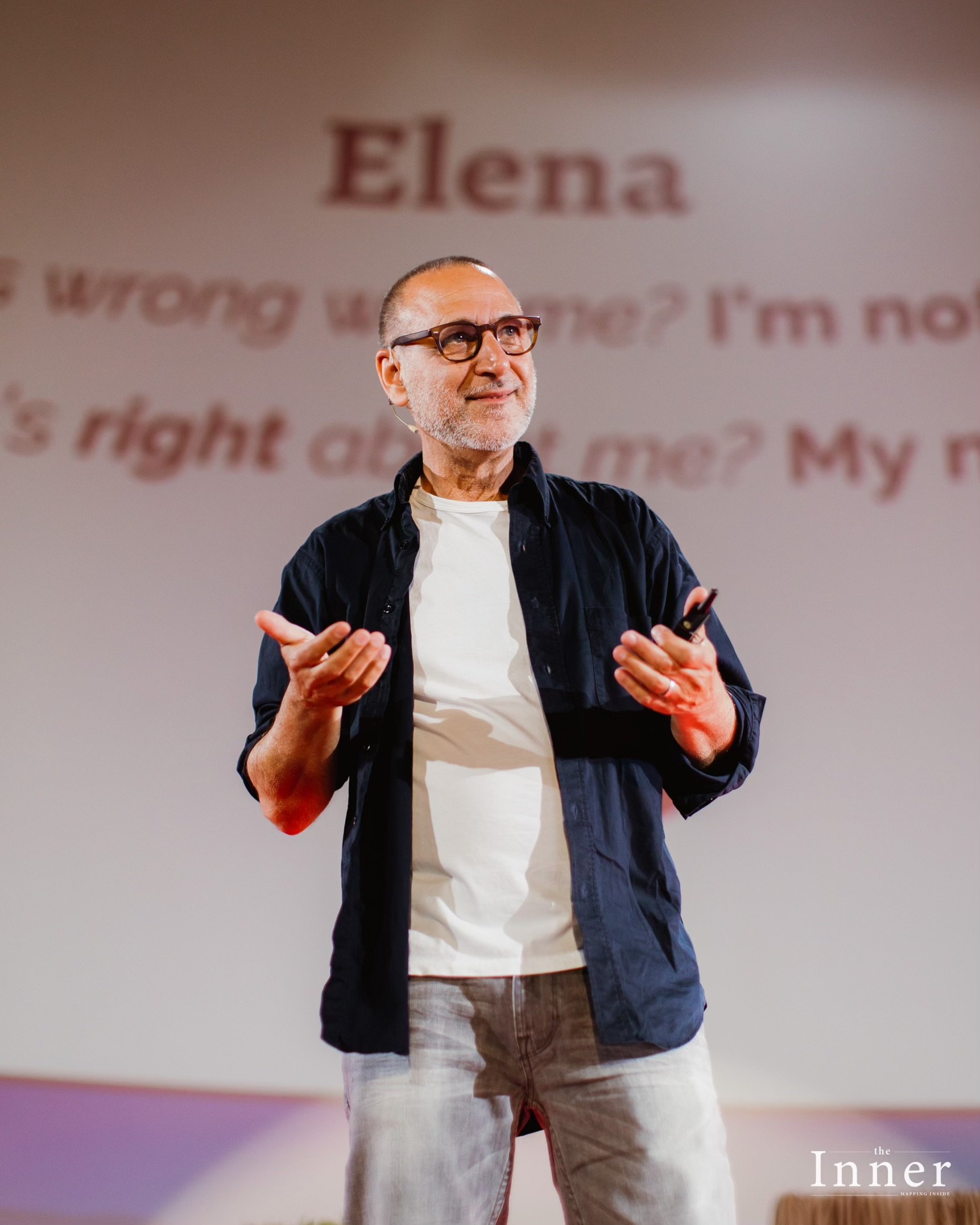
Relationship Detox
MASTERCLASS
With Lisa Blair and David Bedrick

Recently we got into an argument. Something felt off; there was an unaddressed conflict in the air. Something wasn’t getting expressed between us. We were both holding back.
It just so happened that this occurred on the same weekend that we decided to do a juice cleanse to detox our bodies.
Realizing what was happening, we decided to say the strong things that we each seemed to be holding back. In order to do that in a way that would not injure, in a way that would further our understanding and intimacy, we made a safe container to do this by speaking in the form of a role play.
We practiced saying the strong things even stronger, wilder, freer, and more extreme. This led to bumps that were uncomfortable at times, but this also led to experiences, feelings, and declarations that had been previously hidden. We heard each other and we heard ourselves.
We let these parts of ourselves get even more extreme...
David said, “You should always follow me! I know better!”
Lisa responded, “I will never put myself second to you! I have my own authority!”
Other issues arose through our ‘new’ empowered voices—things that had been held back for too long. It was important to not try to resolve these things too quickly: money issues, tiredness, stress, and longings. If we did, we would be trying to make them go away instead of furthering the support of our voices and feelings.
Though it was bumpy at times, we both started feeling closer—in fact, that was the point.
And, Relationship Detox was born.

Overview: In this class, you will:
Make an embodied connection with your sense of safety in conflict.
Discover what you are holding back, what you typically don’t say, in your relationship.
Learn to express the parts of yourself and the energies that you’re holding back beyond the content.
We’ll be teaching this in a way that’s different than how you have previously approached tensions and hot spots in relationship.
Most people focus on their inner experiences, their own personal psychology—their traumas, their attachment styles, their parent issues, their communication issues. We’re focusing on making intimacy which requires you to come as you are—with all of your difficulties, your partially healed and unhealed self, and making a dance together out of that.
What do you hold back in relationship? What parts of yourself do you censor? What do you not express? When do you focus on your inner work, your psychological issues, and NOT bring yourself forward in relationship?
Who doesn’t hold back in relationship at times? We all have feelings, experiences, thoughts and even fantasies that we don't share with others. That’s normal. There’s even good reason to, at times, suppress ourselves, keep thoughts and feelings inside, like when we decide not to express our anger until we're more settled and solid within ourselves. Or when we don’t want to bring issues to others so as not to burden them with some of our difficulties.
Many of us have learned to meditate, do inner work, regulate our nervous system, work on our triggers, release our anger, punch pillows, or simply suppress our feelings. While these approaches can be healing and are excellent tools for our self-care and relationship toolkits, they are insufficient when it comes to creating sustainable resolutions or building a deeper intimacy. That is because these strategies often serve to gaslight or deny our full experience, aspects of our whole selves. In other words, we often use these strategies to chill ourselves out or get rid of our feelings.
For example, I may be feeling critical. But I think this is not okay, or not useful, so I hold back. Or I may be feeling angry and think it would be wrong to bring it forward. Or if I'm feeling confused, I may believe I should wait until I get clear before I speak. Essentially, I am marginalizing parts of myself. I’m waiting for a ‘more cleaned up’ version of myself.
What happens when we follow that paradigm?
Working with clients over 20 years, we have learned that practicing holding back doesn’t lead to deeper intimacy. In fact, if there are hurts, or wounds, it may even lead to creating scar tissue which can prevent intimacy for years to come. Instead of a clear and clean conflict, we feel long-term tensions, resentments, or moods. We refer to these as a form of “chronic relationship depression,” putting distance between us and others—a distance that can grow into an insurmountable chasm.
And now, you’re wondering how you arrived at this place and what on earth you can do to bridge this ever-widening gap.

Conventional conflict strategies seek to “resolve” our differences, not highlight them and celebrate them.
Conventional conflict strategies seek to return relationships to the status quo instead of fostering true transformation.
Conventional conflict strategies focus on the content of our conflicts instead of the deeper underlying feelings, dynamics, and energies.
Conventional conflict strategies forward conciliation and compromise instead of helping us meet each other in a more empowered, embodied, and energetic truth.
In short conventional strategies rely on suppression, forms of denial, fixing, and individual work rather than intimacy-making.
We’re offering you a new paradigm—a true diversity-oriented approach to conflict based on David’s Unshaming way.
To follow the unshaming way, you will need tools to access what you hold back, including those things you aren’t even aware of holding back. The unshaming way deepens and unfolds conflict by going beyond the words and content of our differences. And then, the unshaming way requires a consensus around processing these experiences in a container that both people are going to do their darndest to bring their awareness to what’s happening.
This isn’t just venting. This is conscious and intentional, but not only controlled. There has to be a shared sense you're each caring about yourselves and each other. And, while holding this intention, you must also take the risk to go beyond where you normally go.
To move beyond the content, you will need somatic tools, what David calls Radical Soma—body feelings, movement, and voice. You will need to learn to hold conflict as a role play (emphasis on PLAY). This new paradigm focuses on deepening connection, exploring the shadow, and practicing relational alchemy where the problem is actually a doorway to intimacy.
Using these strategies, following the unshaming way, not only lets the “shit” come out but clears away stuck feelings, moods, and scar tissue. In other words, IT’S RELATIONSHIP DETOX.
How do you typically deal with forbidden feelings and expressions in your relationship?
What would you say during a conflict if you felt free to speak openly?
What if expressing these things led to feeling closer to your partner rather than more distant? What would that mean for your relationship?
It’s not just our bodies that benefit from a detox.
When we're in a relationship that “stuff,” that “junk,” that doesn't get expressed, gets suppressed and overtime, those things build up becoming kind of like a toxin. Our bodies are not separate from our feelings and experiences, which include being in relationships, so suppressing these aspects of ourselves also gets loaded onto the body and onto our organs.
The concept of a Relationship Detox is where we create this container to use the metaskills of play and curiosity in order to more freely express ourselves through a filter of awareness so that things don’t just explode out but the pressure still gets released.

Get instant access to the Relationship Detox class recording for $55
Please note: This class is not intended for abusive or violent relationships. Working with abuse or violence requires a different set of skills and support than this webinar can provide. Please seek therapeutic support.

Meet Lisa
Lisa Blair, MA, Dipl. PW, is a scholar, a PhD candidate at the California Institute of Integral Studies, and a psychotherapist who consults and teaches internationally. Her doctoral work explores redefining intimacy to address the unprecedented challenges romantic partners face in a postnormal world. Her research has been published in World Futures, the Journal of Consciousness Studies, and the 2nd edition of the International Handbook of Love. She and her husband David Bedrick co-host In Two Deep, a podcast about emotional intimacy, conflict, and connection from a depth psychological perspective. Lisa is also the publisher at Belly Song Press, a small independent press of nonfiction titles in psychology, social justice, and leadership.

Meet David
David Bedrick, J.D., Dipl. PW is a process worker, attorney and facilitator. For over 30 years, he has supported his students in creating a life free from shame, where they are deeply connected to the wisdom and vitality of their truest self.
David is the founder of the Santa Fe Institute for Shame-based Studies where he teaches and works with individuals around the world. He is the author of four books on psychology and activism. His fourth book, The UnShaming Way, was just published by North Atlantic Books in 2024.








